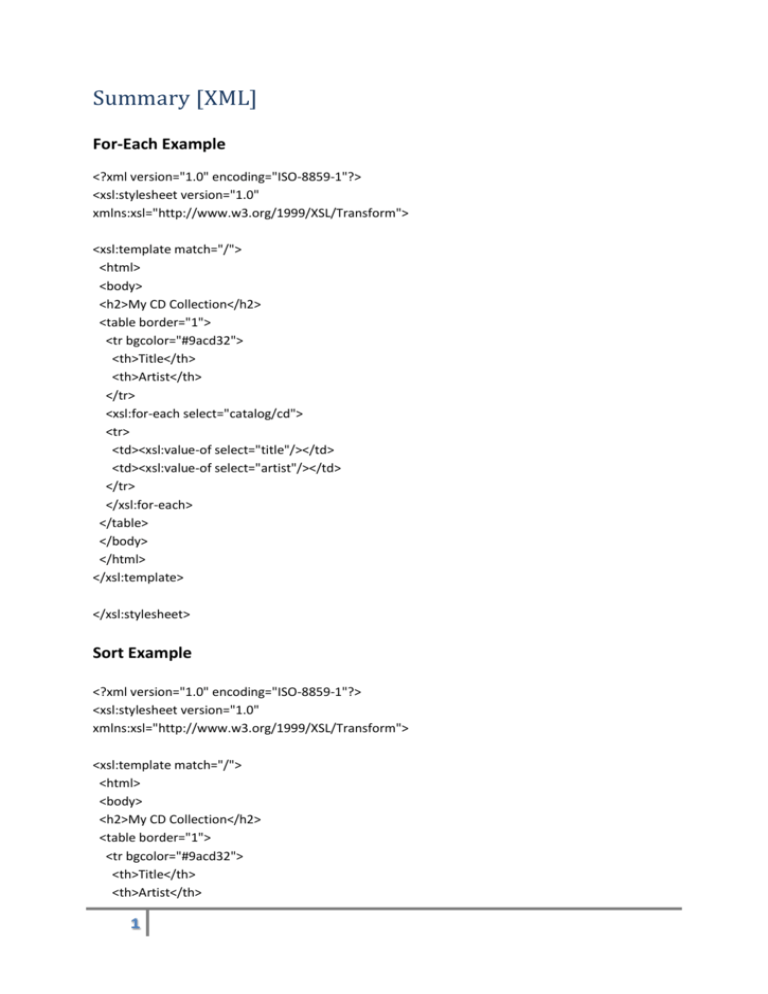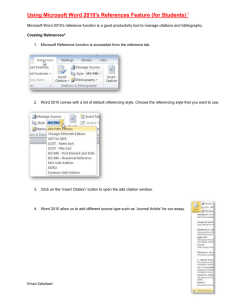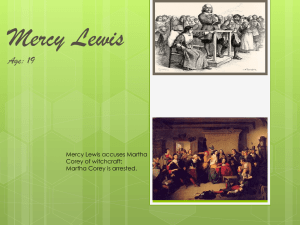A-Z
advertisement

Summary [XML] For-Each Example <?xml version="1.0" encoding="ISO-8859-1"?> <xsl:stylesheet version="1.0" xmlns:xsl="http://www.w3.org/1999/XSL/Transform"> <xsl:template match="/"> <html> <body> <h2>My CD Collection</h2> <table border="1"> <tr bgcolor="#9acd32"> <th>Title</th> <th>Artist</th> </tr> <xsl:for-each select="catalog/cd"> <tr> <td><xsl:value-of select="title"/></td> <td><xsl:value-of select="artist"/></td> </tr> </xsl:for-each> </table> </body> </html> </xsl:template> </xsl:stylesheet> Sort Example <?xml version="1.0" encoding="ISO-8859-1"?> <xsl:stylesheet version="1.0" xmlns:xsl="http://www.w3.org/1999/XSL/Transform"> <xsl:template match="/"> <html> <body> <h2>My CD Collection</h2> <table border="1"> <tr bgcolor="#9acd32"> <th>Title</th> <th>Artist</th> 1 </tr> <xsl:for-each select="catalog/cd"> <xsl:sort select="artist"/> <tr> <td><xsl:value-of select="title"/></td> <td><xsl:value-of select="artist"/></td> </tr> </xsl:for-each> </table> </body> </html> </xsl:template> </xsl:stylesheet> If Example <?xml version="1.0" encoding="ISO-8859-1"?> <xsl:stylesheet version="1.0" xmlns:xsl="http://www.w3.org/1999/XSL/Transform"> <xsl:template match="/"> <html> <body> <h2>My CD Collection</h2> <table border="1"> <tr bgcolor="#9acd32"> <th>Title</th> <th>Artist</th> </tr> <xsl:for-each select="catalog/cd"> <xsl:if test="price &gt; 10"> <tr> <td><xsl:value-of select="title"/></td> <td><xsl:value-of select="artist"/></td> </tr> </xsl:if> </xsl:for-each> </table> </body> </html> </xsl:template> </xsl:stylesheet> 2 Choose Example <?xml version="1.0" encoding="ISO-8859-1"?> <xsl:stylesheet version="1.0" xmlns:xsl="http://www.w3.org/1999/XSL/Transform"> <xsl:template match="/"> <html> <body> <h2>My CD Collection</h2> <table border="1"> <tr bgcolor="#9acd32"> <th>Title</th> <th>Artist</th> </tr> <xsl:for-each select="catalog/cd"> <tr> <td><xsl:value-of select="title"/></td> <xsl:choose> <xsl:when test="price &gt; 10"> <td bgcolor="#ff00ff"> <xsl:value-of select="artist"/></td> </xsl:when> <xsl:otherwise> <td><xsl:value-of select="artist"/></td> </xsl:otherwise> </xsl:choose> </tr> </xsl:for-each> </table> </body> </html> </xsl:template> </xsl:stylesheet> The XML Example Document We will use the following XML document in the examples below. <?xml version="1.0" encoding="ISO-8859-1"?> 3 <bookstore> <book> <title lang="eng">Harry Potter</title> <price>29.99</price> </book> <book> <title lang="eng">Learning XML</title> <price>39.95</price> </book> </bookstore> Selecting Nodes XPath uses path expressions to select nodes in an XML document. The node is selected by following a path or steps. The most useful path expressions are listed below: Expression nodename / // . .. @ Description Selects all child nodes of the named node Selects from the root node Selects nodes in the document from the current node that match the selection no matter where they are Selects the current node Selects the parent of the current node Selects attributes In the table below we have listed some path expressions and the result of the expressions: Path Expression bookstore /bookstore Result Selects all the child nodes of the bookstore element Selects the root element bookstore bookstore/book //book bookstore//book Note: If the path starts with a slash ( / ) it always represents an absolute path to an element! Selects all book elements that are children of bookstore Selects all book elements no matter where they are in the document Selects all book elements that are descendant of the bookstore element, no matter where they are under the bookstore element Selects all attributes that are named lang //@lang Predicates 4 Predicates are used to find a specific node or a node that contains a specific value. Predicates are always embedded in square brackets. In the table below we have listed some path expressions with predicates and the result of the expressions: Path Expression /bookstore/book[1] Result Selects the first book element that is the child of the bookstore element. /bookstore/book[last()] /bookstore/book[last()-1] /bookstore/book[position()<3] //title[@lang] //title[@lang='eng'] /bookstore/book[price>35.00] /bookstore/book[price>35.00]/title Note: IE5 and later has implemented that [0] should be the first node, but according to the W3C standard it should have been [1]!! Selects the last book element that is the child of the bookstore element Selects the last but one book element that is the child of the bookstore element Selects the first two book elements that are children of the bookstore element Selects all the title elements that have an attribute named lang Selects all the title elements that have an attribute named lang with a value of 'eng' Selects all the book elements of the bookstore element that have a price element with a value greater than 35.00 Selects all the title elements of the book elements of the bookstore element that have a price element with a value greater than 35.00 Selecting Unknown Nodes XPath wildcards can be used to select unknown XML elements. Wildcard * @* node() Description Matches any element node Matches any attribute node Matches any node of any kind In the table below we have listed some path expressions and the result of the expressions: Path Expression /bookstore/* //* 5 Result Selects all the child nodes of the bookstore element Selects all elements in the document //title[@*] Selects all title elements which have any attribute Selecting Several Paths By using the | operator in an XPath expression you can select several paths. In the table below we have listed some path expressions and the result of the expressions: Path Expression //book/title | //book/price //title | //price /bookstore/book/title | //price Result Selects all the title AND price elements of all book elements Selects all the title AND price elements in the document Selects all the title elements of the book element of the bookstore element AND all the price elements in the document <!DOCTYPE NEWSPAPER [ <!ELEMENT NEWSPAPER (ARTICLE+)> <!ELEMENT ARTICLE (HEADLINE,BYLINE,LEAD,BODY,NOTES)> <!ELEMENT HEADLINE (#PCDATA)> <!ELEMENT BYLINE (#PCDATA)> <!ELEMENT LEAD (#PCDATA)> <!ELEMENT BODY (#PCDATA)> <!ELEMENT NOTES (#PCDATA)> <!ATTLIST ARTICLE AUTHOR CDATA #REQUIRED> <!ATTLIST ARTICLE EDITOR CDATA #IMPLIED> <!ATTLIST ARTICLE DATE CDATA #IMPLIED> <!ATTLIST ARTICLE EDITION CDATA #IMPLIED> ]> 6








